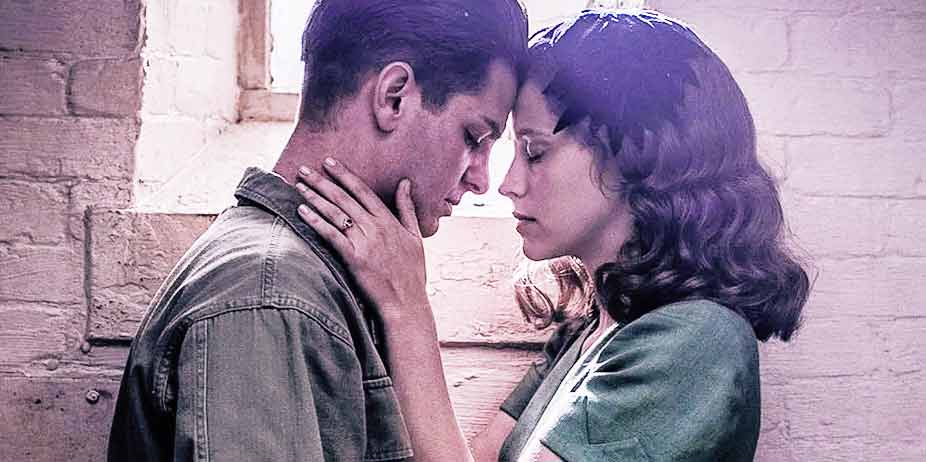 Hacksaw
Ridge (2016)
Hacksaw
Ridge (2016)
Since my relatives are Seventh Day Adventists, I grew up with some understanding of and familiarity with Desmond Doss. The film is a graphic but touching depiction of his struggles to maintain independence and serve his country without needing to carry a gun, and his remarkable actions in battle.
Her eyes catch him from across the room when Desmond (Andrew Garfield) enters the hospital. He does not know her name yet, but somehow he knows... this is the woman he will marry. Dorothy (Theresa Palmer) agrees to go on a date with him after he donates blood just to spend a few minutes in her company. The two become fond of one another... and then war arrives. Despite their PTSD-torn father (Hugo Weaving) trying to dissuade them from battle, Desmond's brother enlists. And then Desmond feels driven to serve. Only one problem: he refuses to kill anyone, or carry a gun.
This does not go over well in his battalion. It draws disbelief and scorn from his commanding officers, who target him, force him to run laps, and threaten him with a court marital if he disobeys direct orders. But Desmond takes his licks, does not rat on his abusive fellow soldiers, and stands his ground. He wants to serve. He wants to be a medic. He feels this is the right thing to do. And... it lands him in a courtroom.
Little do his sneering comrades know that in a few short months, Desmond is going to save most of their lives.
This is a brutal film. There's no way around it. It's one of the most graphic war movies I've ever seen. War is truly hell, and here it is shown in all its hideousness. Not everyone makes it out alive. But armed with nothing other than courage and his faith, Desmond does something no other man dared: he stays behind when others flee, and drags over seventy wounded soldiers from the battlefield. It's the stuff of legends... and the real Desmond waited almost to the end of his life to give permission for anyone to write about or film his story. That's just the humble man he was. And this film does him justice, with respect to him as a human being, as a remarkable man, and as a believer. Some might wonder why he stands so hard on his convictions, but none can deny his actions were remarkable.
If you do choose to watch it, I recommend also viewing the hour and fifteen minute making of featurette, which is about the real Desmond, and the process of making the film. It includes interviews with his living family members and his son. Perhaps the greatest tribute the film can receive is that his son says, with tears in his eyes, "I felt like I was watching my dad." Hollywood has a long history of changing events, shifting characters, and not always being true to the source material; but Mel Gibson has gone out of his way to pay homage to a little-known soldier who did great things in the name of his faith. It is not completely accurate to events, but ironically, the more remarkable aspects of Desmond's battlefield experiences, as Mel says with a chuckle, "you would not believe... and think I made it up." Sometimes, truth is indeed harder to believe than fiction.
Sexual Content:
A man exercises naked in the dorm and then must train
naked when caught; we see his bare backside several
times, and his hands covering his genitals.
Language:
Occasional profanities.
Violence:
Extremely graphic and bloody war violence, in which men
are blown apart, shot in the head (with blood spatter),
and have legs and arms missing. One example is a soldier
using a dead man's torso with everything severed under
the ribcage (skin hanging loose) as a shield in a combat
zone. Implications of domestic violence / abuse; a boy
threatens his father with a gun and hits his brother in
the head with a brick (knocking him unconscious).
Other:
Stereotypical depictions of Japanese enemy soldiers.
